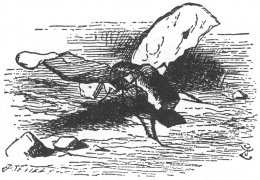Difference between revisions of "Chapter 17"
(Created page with "thumb|right|200px| Because she was a woman, because she was an administrator on Wikipedia, and because she had once blocked him <blockquote>It had begu...") |
|||
| (6 intermediate revisions by the same user not shown) | |||
| Line 1: | Line 1: | ||
| − | [[File:Chapter | + | [[File:Chapter 16.jpg|thumb|right|260px| Wikipedia has been created without any apparent design]] |
| − | <blockquote> | + | <blockquote>Unlike an architect who represents a building on a drawing board, a termite is unable to represent the termite nest that it is helping to build, probably not even in its understanding, which is limited to a handful of rules. If you come across a woodchip and you are ''not'' already carrying one, then pick it up. If you ''are'' carrying one, then ''drop'' it. If there is any sense in which a termite is ''trying'' to do something, then following those simple rules is all it is trying to do. It is not trying to build a handsome termite mound, even though that is the end result.</blockquote> |
| − | |||
| − | + | Many people, astonished by its rapid growth into a comprehensive and organised source of human knowledge in the first decade of the twentieth century, have compared Wikipedia to an ‘emergent system’. Without any apparent hierarchy or management structure, or any form of centralised decision making, and without any specific role or standing for experts, Wikipedians have in less than ten years created something that ''looks'' like an encyclopedia, and which contains more than three million articles in nearly a million categories. Yet it has been created without any apparent design. | |
| + | Is there ''actually'' a group intelligence at work? To understand this better, we test a Wikipedia article, created in 2001, and assess the quality of the article and of the individual contributions, to see whether the overall quality is greater than the sum of its parts. Has the article been improved by some ‘unspecified quasi-Darwinian process’? Do unqualified editors add anything of value, or do they cause harm by making it difficult to maintain, preventing improvement and driving away those who are capable of improving it? | ||
| + | |||
| + | <noinclude> | ||
==See also== | ==See also== | ||
*[[Chapter 16]] | *[[Chapter 16]] | ||
| Line 11: | Line 13: | ||
[[Category:Chapters]] | [[Category:Chapters]] | ||
| + | [[category:Released]] | ||
| + | </noinclude> | ||
Latest revision as of 16:35, 5 April 2014
Unlike an architect who represents a building on a drawing board, a termite is unable to represent the termite nest that it is helping to build, probably not even in its understanding, which is limited to a handful of rules. If you come across a woodchip and you are not already carrying one, then pick it up. If you are carrying one, then drop it. If there is any sense in which a termite is trying to do something, then following those simple rules is all it is trying to do. It is not trying to build a handsome termite mound, even though that is the end result.
Many people, astonished by its rapid growth into a comprehensive and organised source of human knowledge in the first decade of the twentieth century, have compared Wikipedia to an ‘emergent system’. Without any apparent hierarchy or management structure, or any form of centralised decision making, and without any specific role or standing for experts, Wikipedians have in less than ten years created something that looks like an encyclopedia, and which contains more than three million articles in nearly a million categories. Yet it has been created without any apparent design.
Is there actually a group intelligence at work? To understand this better, we test a Wikipedia article, created in 2001, and assess the quality of the article and of the individual contributions, to see whether the overall quality is greater than the sum of its parts. Has the article been improved by some ‘unspecified quasi-Darwinian process’? Do unqualified editors add anything of value, or do they cause harm by making it difficult to maintain, preventing improvement and driving away those who are capable of improving it?
